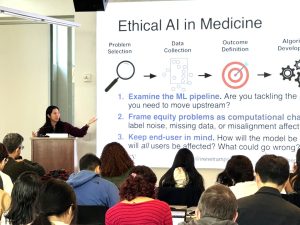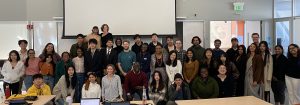FOR IMMEDIATE RELEASE
TECHCON 2014: UNIVERSITY INNOVATORS TRANSCEND ACADEMIC SILOS TO PRESENT CUTTING-EDGE COLLABORATIONS FOR GLOBAL DEVELOPMENT
Young solvers put theory into action to improve quality of life for the global community
Berkeley, CA (November 10, 2014) – Powered by the idea that science and technology together with academic curiosity can help find transformative solutions to development challenges, over 350 student innovators, faculty researchers, development experts, investors, and thought leaders met this weekend in the Bay Area for the Higher Education Solutions Network’s TechCon 2014.
TechCon 2014, which concludes this afternoon, was the second annual meeting of the Higher Education Solutions Network (HESN), a program launched in 2012 by the United States Agency for International Development (USAID) and located in USAID’s new U.S. Global Development Lab. Through HESN, USAID has created a network of eight Development Labs that harness the ingenuity and passion of university students, researchers, and faculty to incubate and develop new science and tech-based solutions to global challenges in areas such as food security, health, poverty, conflict, and climate change. One of them is UC Berkeley’s Development Impact Lab, which the Blum Center founded in 2012 with a $20 million grant from the USAID, in collaboration with the Center for Effective Global Action, the College of Engineering at UC Berkeley, and the Lawrence Berkeley National Laboratories.
“This Network represents something new and especially exciting in development—something more than a simple collection of universities. It represents a groundbreaking partnership—one that stretches from California to Massachusetts, from Texas to Uganda, united by a single purpose: to mobilize the energy and ingenuity of a new generation of students, inventors, and entrepreneurs—and harness the power of science, technology, and innovation to deliver transformational results in development. These efforts are ensuring that hungry children have nutritious meals; that rural entrepreneurs have access to power; and that smallholder farmers have strong, resilient harvests,” said Rajiv Shah, USAID Administrator.
The three-day summit, themed “Connecting to Accelerate Global Development,” featured an Innovation Marketplace where young innovators showcased their work, a “Shark Tank” styled pitch competition, and keynotes that both challenged and inspired attendees to identify new approaches and solutions to the development challenges we face. The annual meeting also served to further strengthen and cultivate this emerging global network of solvers, all of whom are committed to changing development.
Ticora Jones, HESN Division Chief said, “Bridging the divide between invention and global impact is one of the most challenging issues of our time. It’s like running a marathon, while trying to combine strangers and friends to run with you along the way. Connecting individuals and communities with diverse viewpoints, resources, and skills is incredibly hard, but absolutely essential to cross the finish line.”
HESN’s eight university-led Development Labs regularly manage projects in collaborations with networks that include other universities, innovators, investors, and institutions in developing countries. Each Development Lab has a distinct focus, ranging from food security to global health. You can learn more about each HESN Development Lab at www.usaid.gov/hesn.
This year’s TechCon also brought together many of HESN’s partners and stakeholder to celebrate their initiatives and contribute to a dialogue focused on creating, testing, and scaling of solutions. For example:
The Institute for Globally Transformative Technologies at the Lawrence Berkeley National Lab (LIGTT) announced the publication and launch of “50 Breakthroughs” Report, a transformative study conducted over the course of two years that analyzes the problems facing the global poor and identifies where technology can play a pivotal role. The study incorporates input from over 1,000 of the world’s leading experts, and is made possible in part through HESN funding. Find out more at www.ligtt.org.
Development Innovation Ventures (DIV), another flagship program of the U.S. Global Development Lab, announced a $3 million dollar, Stage 3 award to the Zusha! Project. In Kenya, the Zusha! initiative combats road accidents through the simple method of putting stickers in buses, therefore empowering passengers to speak up about reckless driving, for a fraction of the cost of other road safety interventions. The innovation has already had tremendous success and though DIV’s support, will move from a pilot to a solution with potential to reach millions of people, starting with expansion in East Africa. Zusha! is led by researchers from the Georgetown University Initiative on Innovation, Development, and Evaluation (gui²de).
To learn more about the Higher Education Solutions Network and the eight Development Labs, visit www.usaid.gov/hesn





